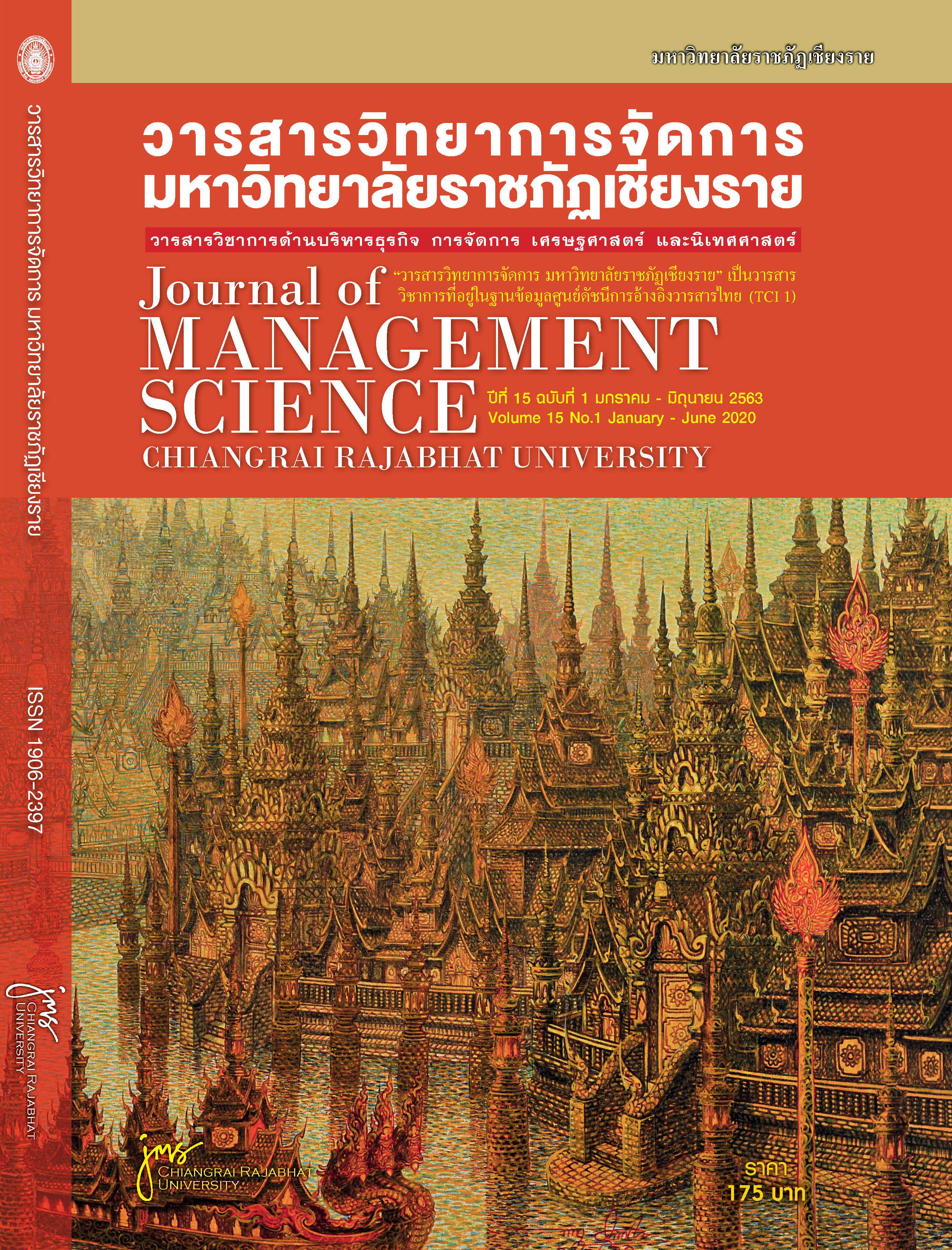The Development of Organic Rice Entrepreneur Network in Sing Buri Province
Main Article Content
Abstract
The purpose of this research is to develop an organic rice entrepreneur network of Sing Buri province. The research is sectioned into 2 phases: 1) studying the organic rice consumption behavior of the people of Sing Buri province by deploying a survey with 400 organic rice consumers in Sing Buri, selected by random sampling. The data were analyzed using descriptive statistics and content analysis for development of the network. 2) The development of organic rice entrepreneur network of Sing Buri province by means of applying participatory action research drawing on the participation of 21 key stakeholders from 3 sectors i.e. entrepreneur (cooperation power), academic (knowledge power), and policy/sponsors (policy power and support). The Deming Cycle (PDCA) was administered by focus group discussion, data triangulation verification and data analysis by content analysis. The significant development revealed that the organic rice entrepreneur network of Sing Buri Province has set the following vision: 1) Most organic rice consumers in Sing Buri province purchased 2 kg of rice for consumption from the OTOP stores. Nutrition is the first priority for making a purchase due to knowledge from the internet. They were satisfied with organic rice in Sing Buri Province at the moderate level. 2) The development of organic rice entrepreneur network in Sing Buri Province consisted of (1) Guidelines for driving the network, (2) Production standards of the network, (3) Process directing the members to produce organic rice according to the network production standards, and (4) Evaluation. The key marketing strategies are 1) product strategy 2) price strategy 3) distribution channel strategy and 4) marketing promotion strategy.
Article Details
Views and opinions expressed in the journal do not necessarily reflect those of the editors.
References
Brainstorming Platform for Organic Rice Network Singburi, 20 August 2015.
Department of Agriculture. (2010). Standard for organic production in Thailand. Bangkok: Ministry of Agriculture and Cooperatives.
Kejpirun, O. (2012). Motivation to grow organic rice by research. Phra Nakhon SiAyutthaya: Phra Nakhon Si Ayutthaya Rajabhat University.
Organic Farming Promotion and Development Group. (2013). Principles of organic rice production. Retrieved September 2, 2016, from webdetail/กลุ่มงานส่งเสริมและพัฒนาเกษตรอินทรีย์-(กสอ.)/218410/
Tinnapop, T., Maksang, S., & Chanbanjong, C. (2016). Supply chain management by Community Enterprises. Organic rice production in Central Thailand. Journal of Research and Development, Humanities and Social Sciences. 11(3), 319-330.
Tawiltung, N. (2009). Long-term effects of organic farming under the organic farming system. (Organic rice) on fertility of Soil and balance of plant nutrients compared to agricultural chemistry. Bangkok: The Thailand Research Fund.
Thuansri, Y. & Morathop, N. (2016). The Network development of organic rice farmers in Uttaradit Province: Case study of Wangapee Sub-district Mueang district Uttaradit Province. Journal of Lampang Rajabhat University. 5(2), 116-132.
Upper Central Province 2. (2016). Study on mechanisms for upgrading rice products and brands to Commercial standards in both domestic and international. Kasetsart University. Retrieved February 8, 2016, from http://www.jpp. moi.go.th/media.pdf.
Wase, P. (1995). “Community and Sustainable Development” ICEA Seventh World Conference, Jomtein Thailand. 31 July - 4 August 1995.
Wongla, R. et.al. (2013). Study and Development of Agro-Business Management System: Uttaradit Rajabhat University with farmer network, Local Organizations in Uttaradit Province and Parties. (Research Report). The Thailand Research Fund.


